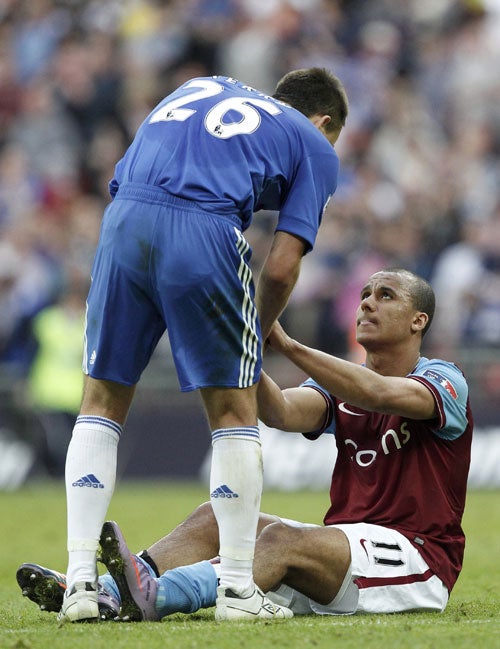Terry's 'horror' tackle leaves O'Neill enraged

Your support helps us to tell the story
From reproductive rights to climate change to Big Tech, The Independent is on the ground when the story is developing. Whether it's investigating the financials of Elon Musk's pro-Trump PAC or producing our latest documentary, 'The A Word', which shines a light on the American women fighting for reproductive rights, we know how important it is to parse out the facts from the messaging.
At such a critical moment in US history, we need reporters on the ground. Your donation allows us to keep sending journalists to speak to both sides of the story.
The Independent is trusted by Americans across the entire political spectrum. And unlike many other quality news outlets, we choose not to lock Americans out of our reporting and analysis with paywalls. We believe quality journalism should be available to everyone, paid for by those who can afford it.
Your support makes all the difference.Martin O'Neill last night said James Milner was "exceptionally lucky to have his career intact" after suffering what he described as a "horrendous" foul by John Terry. Milner was fouled late in the game with Villa trailing 1-0 as he attempted to launch a counter-attack.
"It was a horrendous tackle for an England team-mate to make," said O'Neill. "James is very sore, and very lucky. He has got away with it because he had his leg in the air at the time. He is exceptionally lucky his career is intact."
The Aston Villa manager also criticised Howard Webb, the referee, both for not dismissing Terry – "a straightforward decision, he was right beside it"– and for rejecting Villa's early penalty appeal after John Obi Mikel appeared to foul Gabriel Agbonlahor.
O'Neill's escape from the pressures of management is to study famous crimes. It was a perceived miscarriage of justice which first piqued his interest, the 1962 hanging of James Hanratty for the A6 murder, and he has subsequently tended to focus on the cases where the forces of law and order may be confused or mistaken.
Yesterday provided an unwanted case study when Agbonlahor turned Mikel in the box, then went to ground under the Nigerian's challenge. There is little doubt the striker was looking for a decision, but it also seemed clear that Mikel had cut across Agbonlahor's knee with his thigh. While Agbonlahor beat the turf in exasperated fury O'Neill was apoplectic on the touchline.
"It was a clear-cut penalty [that] a referee I had the utmost regard for until today chose to ignore because of the possible consequences," said O'Neill, referring to the prospect of Mikel being dismissed for denying a goalscoring opportunity.
Stoking his ire was the knowledge that this was the second apparent miscarriage of justice Villa had suffered in two visits to Wembley this season. In the Carling Cup final in February Phil Dowd failed to dismiss Nemanja Vidic after the Manchester United defender brought down Agbonlahor in the box when he was through on goal. Manchester United subsequently won 2-1.
"Five weeks ago the ref bottled it completely," said O'Neill. "I thought it was an injustice then, and an injustice today. Maybe we have just just been desperately unlucky, but they are game-changing decisions. I can't tell we would win if Chelsea were down to 10, or nine, but they change the game, the outlook. Referees have the consequences [a dismissal] on their mind. They should not just apply the laws; a bit of fair play is all I'm looking for. There are decisions in matches that can be contested; these are incontestable, straightforward decisions."
"It could have been a penalty, maybe," said Carlo Ancelotti, who tends not to comment on refereeing decisions. The Chelsea manager added: "It was a strong tackle in the box."
Last week, after Webb failed to give Louis Saha a penalty in the Everton-West Ham match, or dismiss Sylvain Distin for a professional foul, the former referee Graham Poll said "big decisions" are troubling' England's representative for the World Cup finals and said Webb had "struggled to give penalties all season". The evidence for this assertion is mounting.
There was even an argument that a third Chelsea player could have been dismissed. After Terry had implanted his studs on Milner's calf, Webb waved play on as Stiliyan Petrov had possession. Deco pulled him back. Now Webb halted play and Terry saw a yellow card. Webb should then have booked Deco; play was live when the Portuguese fouled Petrov as Webb had allowed the advantage. Deco had already been cautioned and would have been dismissed.
Aside from the penalty Villa rarely looked like scoring. Yet, such are the narrow margins at this level, had the big decisions gone Villa's way the result may well have been different. Only in the final minutes did Chelsea romp away.
Steve Bruce reflected, when Wigan manager last year, after a disappointment at Stamford Bridge, that the big club always get the benefit of the doubt on tight decisions. He had, he admitted, enjoyed this advantage when a Manchester United player. It seems only when, or if, O'Neill gets a big four job will he have justice on his side.
Join our commenting forum
Join thought-provoking conversations, follow other Independent readers and see their replies
Comments